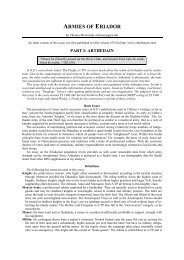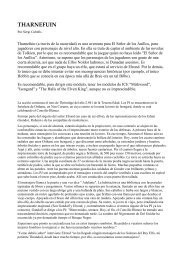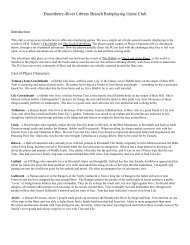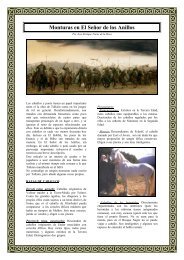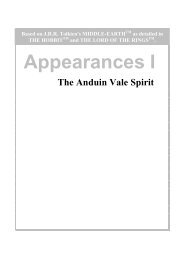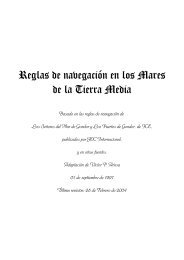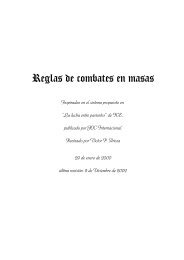Vinyar Tengwar 39 - Fan Modules - Free
Vinyar Tengwar 39 - Fan Modules - Free
Vinyar Tengwar 39 - Fan Modules - Free
Create successful ePaper yourself
Turn your PDF publications into a flip-book with our unique Google optimized e-Paper software.
————————————— <strong>Vinyar</strong> <strong>Tengwar</strong> <strong>39</strong> (July 1998) ———————————<br />
power to make this effective by will. Nothing can penetrate the barrier of<br />
Unwill (Note 3).<br />
All these things, says Pengolodh, are true of all minds, from the Ainur in<br />
the presence of Eru, or the great Valar such as Manwë and Melkor, to the<br />
Maiar in Eä, and down to the least of the Mirröanwi. But different states bring<br />
in limitations, which are not fully controlled by the will.<br />
The Valar entered into Eä and Time of free will, and they are now in Time,<br />
so long as it endures. They can perceive nothing outside Time, save by<br />
memory of their existence before it began: they can recall the Song and the<br />
Vision. They are, of course, open to Eru, but they cannot of their own will<br />
“see” any part of His mind. They can open themselves to Eru in entreaty, and<br />
He may then reveal His thought to them (Note 4).<br />
The Incarnates have by the nature of sáma the same faculties; but their<br />
perception is dimmed by the hröa, for their fëa is united to their hröa and its<br />
normal procedure is through the hröa, which is in itself part of Eä, without<br />
thought. The dimming is indeed double; for thought has to pass one mantle of<br />
hröa and penetrate another. For this reason in Incarnates transmission of<br />
thought requires strengthening to be effective. Strengthening can be by<br />
affinity, by urgency, or by authority.<br />
Affinity may be due to kinship; for this may increase the likeness of hröa to<br />
hröa, and so of the concerns and modes of thought of the indwelling fëar,<br />
kinship is also normally accompanied by love and sympathy. Affinity may<br />
come simply from love and friendship, which is likeness or affinity of fëa to<br />
fëa.<br />
Urgency is imparted by great need of the “sender” (as in joy, grief or fear);<br />
and if these things are in any degree shared by the “receiver” the thought is the<br />
clearer received. Authority may also lend force to the thought of one who has a<br />
duty towards another, or of any ruler who has a right to issue commands or to<br />
seek the truth for the good of others.<br />
These causes may strengthen the thought to pass the veils and reach a<br />
recipient mind. But that mind must remain open, and at the least passive. If,<br />
being aware that it is addressed, it then closes, no urgency or affinity will<br />
enable the sender’s thought to enter.<br />
Lastly, tengwesta has also become an impediment. 8 It is in Incarnates<br />
clearer and more precise than their direct reception of thought. By it also they<br />
can communicate easily with others, when no strength is added to their<br />
thought: as, for example, when strangers first meet. And, as we have seen, the<br />
use of “language” soon becomes habitual, so that the practice of ósanwe<br />
(interchange of thought) is neglected and becomes more difficult. Thus we see<br />
that the Incarnate tend more and more to use or to endeavour to use ósanwe<br />
only in great need and urgency, and especially when lambe is unavailing. As<br />
when the voice cannot be heard, which comes most often because of distance.





